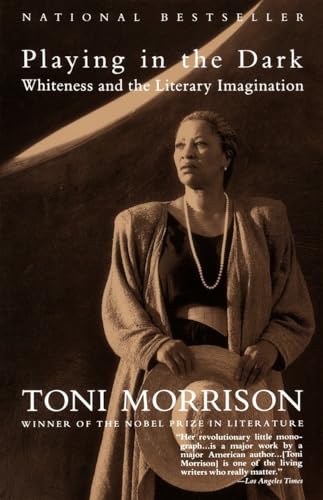Playing in the Dark
Whiteness and the Literary Imagination
Toni Morrison
BOOK REVIEW

Toni Morrison's Playing in the Dark: Whiteness and the Literary Imagination isn't just a book; it's a bold reclamation of literature's power to shape our understanding of race and identity. In just 91 pages, Morrison meticulously dissects how the concept of "whiteness" serves not only as a backdrop but as a driving force in American literary imagination. The brilliance of her prose draws you in-like a theatrical spotlight illuminating the shadows of unexamined biases that pervade classic texts.
Morrison's voice, steeped in the richness of her African American heritage, exposes lurking racial dynamics that many writers, critics, and readers often overlook. She encourages you to confront the unacknowledged influences that whiteness has had on the narrative throughout American literature. This isn't a lightweight read; it's an intellectual excavation, demanding engagement from its readers.
Critics and scholars alike have marveled at how Morrison transforms literary critique into an intimate conversation. She argues that "the absence of blackness" is often a silent theme in the works of celebrated authors, a gap that perpetuates stereotypes and narrows the scope of human experience. The raw honesty in her assessment compels you to rethink canonical works-works that have shaped cultural perceptions and perhaps even your own worldview.
Each page pulsates with the urgency of Morrison's message. Readers have expressed a myriad of responses, from admiration for its unflinching honesty to discomfort at facing their own complicity in these dynamics. Some critics argue that Morrison's perspective feels limiting, while others hail it as groundbreaking. It's this stark divide that perhaps best illustrates her point-the challenge of dissecting race within a literary framework forces us into a space of vulnerability and reflection.
The historical context of Playing in the Dark is as rich as the content. Written during a time when the literary landscape was desperately craving diversity and a broader lens on race, Morrison became a critical voice, illustrating that whiteness is not only a racial identity but also a profoundly influential cultural force. Her insights resonate especially today amidst ongoing dialogues about systemic racism and representation in the arts. 🌍
Morrison's innovative critique doesn't merely challenge existing narratives; it illuminates paths for new dialogues about race and literature. The ripples of her work extend far beyond its pages, inspiring generations of writers and thinkers. From playwrights like Lynn Nottage to filmmakers such as Barry Jenkins, the echoes of Morrison's principles continue to redefine how art intersects with identity and experience.
Dare to engage with Morrison's text, and you might find your perception forever altered. It's not merely a book you read-the experience is transformative, leaving you grappling with questions about privilege, narrative construction, and the fullness of the American experience. The tears, the laughter, and the anger that Morrison elicits from you can ignite a conversation that extends well beyond the confines of literature.
As you dive into Playing in the Dark, prepare to be unsettled and inspired. This is more than just an academic treatise; it's a call to arms, urging you to lift the veil of complacency and confront the seismic shifts needed in literature and society alike. The literary landscape Morrison critiques is one rife with potential for change, awaiting the bold voices willing to speak truth to power-much like Morrison herself. 💥
📖 Playing in the Dark: Whiteness and the Literary Imagination
✍ by Toni Morrison
🧾 91 pages
1993
#playing #dark #whiteness #literary #imagination #toni #morrison #ToniMorrison